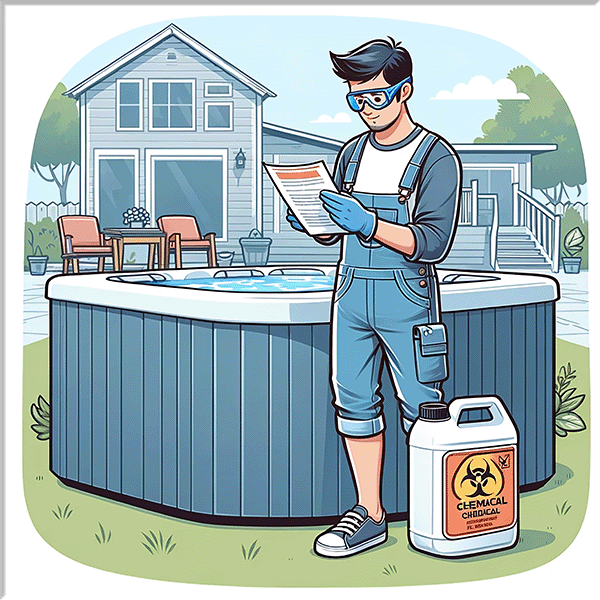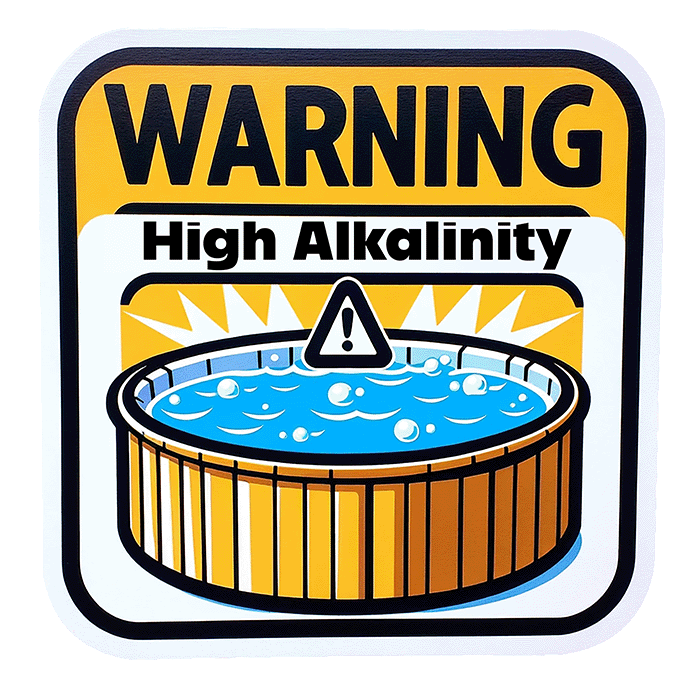Balancing your hot tub water is one of the most important steps you can take to keep your spa comfortable, safe, and long-lasting. When total alkalinity drifts out of range, it affects everything — the way your water feels, how your sanitizer performs, and even how long your equipment lasts.
High alkalinity is one of the most common water balance issues hot tub owners face. It can make the water cloudy, raise pH to stubborn levels, and leave behind chalky white flakes or calcium buildup around your jets and heater. Luckily, fixing it isn’t difficult — it just takes a little understanding, patience, and the right products.
In this guide, we’ll explain what alkalinity really is, why it matters, and the best way to lower it safely and effectively — plus how to keep it in balance long term.
What Is Alkalinity
The Role of Alkalinity
Total alkalinity (TA) measures the water’s ability to neutralize acids. Think of it as your water’s stability factor — it helps control how easily your pH level moves up or down. Without this buffer, small chemical or environmental changes could swing your pH out of balance in minutes.
When your alkalinity is in range, your water stays calm and predictable. Your sanitizer works properly, your skin feels smooth, and your equipment stays protected from corrosion and scaling.
When It’s Too Low

When It’s Too High
High alkalinity, on the other hand, makes the water resist pH change. Your pH stays elevated, often above 8.0, leading to cloudy water, scaling, and buildup that looks like white flakes or rough deposits on the shell. High alkalinity can also reduce the effectiveness of chlorine or bromine, allowing bacteria to grow even when sanitizer levels appear correct.
The Ideal Balance
The Sweet Spot
For most spas, total alkalinity should be between 80 and 120 parts per million (ppm). Below 80, the water becomes acidic and corrosive. Above 120, scaling and cloudy water become more likely.
Regular Testing
Test your water weekly with fresh test strips or a liquid test kit. If your readings seem inconsistent, bring a sample to Love’s Hot Tubs in Emmett for a free professional test. Idaho water can have naturally high mineral content, so testing regularly prevents surprises.
Causes of High Alkalinity
Even careful spa owners can end up with alkalinity that creeps too high. A few common reasons include:
Using hard tap water — Many areas of Idaho have high calcium and mineral content, which raises alkalinity.
Adding too many pH increasers — These often raise alkalinity along with pH.
Evaporation and topping off — When water evaporates, minerals remain behind, concentrating alkalinity.
Neglecting regular testing — Small imbalances build up gradually over time.
Understanding these causes helps you prevent the issue from repeating once it’s corrected.
How To Lower Alkalinity in a Hot Tub
When alkalinity tests above 120 ppm, it’s time to adjust. Here’s how to bring your levels back into range safely.
Step 1: Testing The Water
Use a reliable water test kit to measure your current total alkalinity. The ideal range is typically 80–120 ppm. Accurate readings help you determine how much product to add.
Step 2: Turn Off the Hot Tub
Power down the spa before adding any chemicals. This improves safety and helps treatments work as intended.
Step 3: Add alkalinity reducer
Carefully measure and add a spa-specific alkalinity reducer (e.g., sodium bisulfate). Follow the manufacturer’s directions for dosage based on your test results.
Step 4: Distribute the reducer evenly
Sprinkle the product evenly across the water’s surface—don’t dump it all in one spot. Even distribution supports uniform results.
Step 5: Stir the water
Using a spa brush (or similar tool), gently move the water to help the reducer mix through the full volume of the tub.
Step 6: Wait for dissolution
Allow the product to dissolve and react—about 1 hour. Keep the spa off during this time.
Step 7: Retest and Repeat if Needed
After the waiting period, test alkalinity again. If it’s still above range, repeat the process in small increments until you reach your target.
Step 8: Balance other chemicals
Once alkalinity is corrected, re-balance any other parameters that shifted—especially pH and your sanitizer level.
Step 9: Turn on the hot tub
When alkalinity is in range and the rest of your chemistry is balanced, turn the spa back on and resume normal operation.
Safety Note
Always handle chemicals with care. Follow label instructions, store products securely, and keep them away from children and pets.
Free PDF Lowering Hot Tub Alkalinity

Safety Tips
When using any spa chemical, safety always comes first.
Wear protective gloves and goggles when handling acids or powdered chemicals.
Never mix chemicals directly together.
Always add chemicals to water, not the other way around.
Store containers upright in a cool, dry location out of reach of children and pets.
If you ever spill a product or experience irritation, rinse immediately with clean water and consult the product label for safety guidance.
Why Balance Matters
Balanced alkalinity is about more than water clarity — it’s about protecting your investment and your health. When your water chemistry is stable:
Sanitizers work effectively, keeping your water clean and safe.
Your skin feels softer and less dry after each soak.
Equipment like pumps, heaters, and jets last longer.
You spend less time troubleshooting and more time relaxing.
Cloudy or scaling water is usually the first visible sign of high alkalinity, but it’s also the easiest to prevent. A few minutes of testing and adjusting each week keeps your spa sparkling and inviting.
At Love’s Hot Tubs, we’ve seen how a simple maintenance routine can completely change a customer’s spa experience. Whether you’re new to hot tub ownership or have been soaking for years, we’re here to help you enjoy clearer, cleaner water all year long.
Visit Love’s Hot Tubs
Need help balancing your spa water? Visit Love’s Hot Tubs in Emmett for professional water testing, eco-friendly products, and personalized advice. Our team can walk you through every step — from lowering alkalinity to choosing the right sanitizer for your lifestyle.
Download your free guide:
Lowering Hot Tub Alkalinity (PDF) — your detailed reference for keeping your spa perfectly balanced.
References
“Here’s How To Lower The Alkalinity In A Hot Tub” – Elizabeth Heath, Family Handyman
Centers for Disease Control (CDC): Healthy Swimming & Spa Water Guidelines

